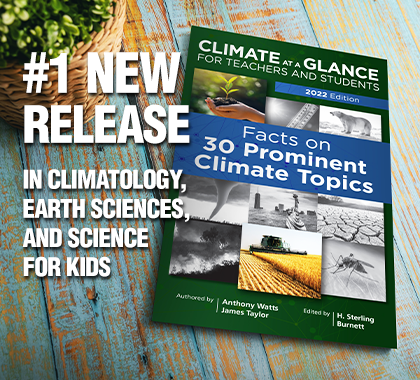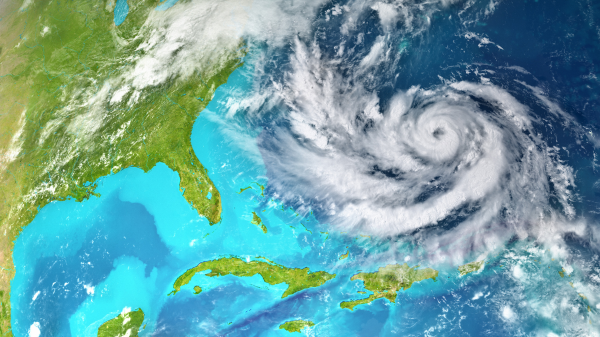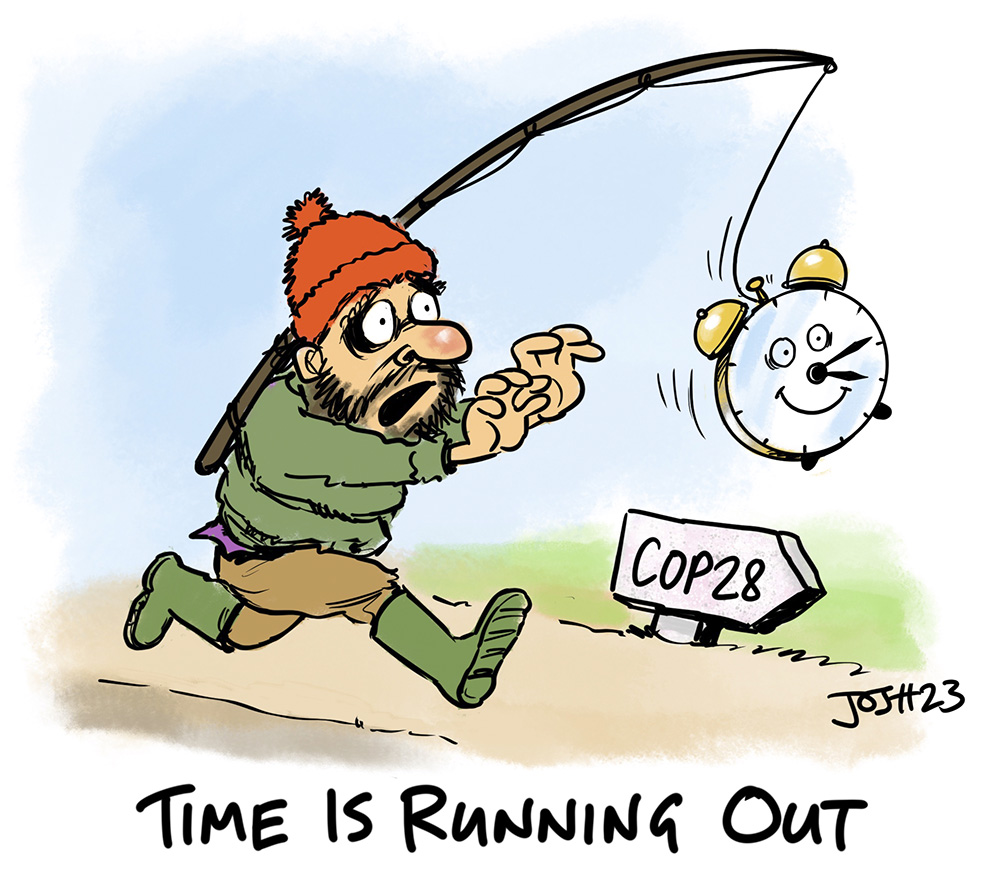YOU SHOULD SUBSCRIBE TO CLIMATE CHANGE WEEKLY.
IN THIS ISSUE:
- Fighting for Truth in Climate Science Is Important
- Podcast of the Week: UN Climate Conference Czars: You Need to Eat a Lot Less Meat
- Science Is Increasingly Becoming Pay to Publish
- No, the Number of Global Natural Disasters Is Not Increasing
- U.S. Hurricane Overview Shows No Climate Induced Uptick
- Climate Comedy
- Video of the Week: Climate Change Rhetoric Becoming “More Militant”
- Recommended Sites
Miss Anything at Heartland’s Climate Conference? No Problem.

Fighting for Truth in Climate Science Is Important

Over more than 30 years of studying climate change, reading hundreds of reports, studies, white papers, commentaries, and news stories on the topic, during which time I’ve written hundreds of thousands of words on the issue, I have come to a few firm conclusions: Climate change is happening—slowly, modestly, but happening; humans may be contributing to it, though whether they are the dominant or even a primary cause is an open question; and there is no evidence so far that climate change is producing dangerous results.
In addition, there is no reason for believing—outside of flawed computer models projections and mantra-like repeated claims from those who in some form or fashion profit from stoking climate fear, in terms of money, resources, power, or all of them combined—that climate change or the human greenhouse gas emissions (and associated fossil fuel use) that are supposedly causing it, pose an existential threat to humankind or the environment.
I don’t claim mine is the majority view on this point. Indeed, my life would be easier—and based on offers that have been made to me, my living standard higher—if I conceded the science and joined with those pushing draconian restrictions on greenhouse gas emissions and profiting from various green energy boondoggles. All I have to do to receive higher pay, accolades, and to bring an end to the abuse and threats from those who think I’m “worse than the Nazis” (something said and written to me a number of times), is to play the game and join the consensus. All that’s holding me back is my stubborn, arguably foolish, belief that I should speak the truth on this and other matters of public import of which I am knowledgeable as I see fit, let the chips fall where they may.
I’m not the only skeptical laborer in the field of climate research and policy. Based on conversations that I have had, most if not all of my colleagues at one time or another have been confronted with the same question or proposal: Why not concede “the science” and fight for rational policies? Some people, whom I generally respect, have done just that. They have over time accepted, or at least have become unwilling to argue about whether, humans are causing dangerous climate change, and now spend their time trying to ensure that policies developed/imposed to fight climate change are economically efficient. I’m not there, yet.
It would be easier to eschew the science and just talk climate policy, but it wouldn’t be honest, and if I began doing so, I would be conceding what I believe to be the moral high ground. Sound science shouldn’t dictate energy policy, but it should inform it. If skeptics concede the science when the causes and consequences of climate change are truly still open questions, then I and my realist colleagues will just be negotiating how much liberty to give up to big government and international bureaucrats, unrestrained by constitutions or democratic representation. In point of fact, all options to reduce fossil fuel emissions have benefits and costs, penalizing some and rewarding others, but the best assessments indicate that prematurely ending the use of fossil fuels will leave the world in general worse off, on balance, economically, than if we adapt to climate change regardless of the cause—which means some people will die and remain poor when they don’t have to.
There is no realistic replacement for fossil fuels in transportation or the thousands of products they are critical to the production of, in the near and medium term. As for electricity, eschewing fossil fuel use in the near and medium term means less reliable power, energy outages, and higher prices. Year after year over the past two decades these statements have been borne out as facts on the ground, academics, progressive politicians, and green energy profiteers’ claims to the contrary. Check your electric power bills and any data on outages.
I have often said that when the science changes, so will my views. If I become convinced that humans are causing dangerous climate change, and that the effects of said change will be more harmful to human freedom and prosperity than the harms that result from restricting fossil fuels, then I’ll support such policies. However, at present, I remain convinced that even if I’m wrong on the science, I’m right about the policy. Increasing wealth, adaptability, and societal resilience—all of which are made possible more quickly through the use of fossil fuels than by banning them—are critical to effectively and beneficially responding to climate change.
As I said, I’m not the only person who holds this point of view. My comments above were sparked most recently by an article by Edward Ring, a contributing editor and senior fellow with the California Policy Center, which he co-founded in 2013. In that article he writes:
If you concede the science, and only challenge the policies that a biased and politicized scientific narrative is being used to justify, you’re already playing defense in your own red zone. You’re going to lose the game. Who cares if we have to enslave humanity? Our alternative is certain death from global boiling! You can’t win that argument. You must challenge the science, and you can, because scientists like John Christy and others are still available.
Ring cites as an example of playing defense, at a great cost to society, the response of big oil companies to the various lawsuits filed in multiple political jurisdictions by cities, states, and various activist groups. Oil companies have largely conceded the science, saying in effect, “Our products have been beneficial, producing a lot of good, but are also changing the climate for the worse, so we agree we must phase them out in a timely fashion. Not now, but over time, and in the meantime, we’re investing in lower carbon solutions.”
That’s like a popular but abusive spouse saying, “Look, I’m a pretty good guy and contribute to society, but along the way, I beat my wife. But I’m doing it less now than in the past, and in the future I expect to stop doing it entirely.” That’s not a very compelling argument.
Big oil decided not to fight for truth in science despite, for example, The Heartland Institute providing a friend of the court brief, in one case, clearly demonstrating that at present no climate catastrophe is evident or in the offing. Rather than fight for their lives, oil companies are fighting for a slower execution. Oil doesn’t want to pay off the various groups trying to extort them, while still conceding the justification for the extortion. Such a strategy doesn’t work, never has, and never will.
As Ring writes:
An aggressive defense against [these] lawsuit[s] by ExxonMobil, Shell, Chevron, ConocoPhillips, BP, and the American Petroleum Institute would attack the core premise of the plaintiffs, the alleged evidence of global warming and extreme weather. Because what is being presented as “evidence” supporting a climate “crisis” is consistently misleading and often outright fraudulent.
Philosopher, novelist, and screen- and play-writer Ayn Rand is reported to have said, “[i]n any compromise between food and poison, it is only death that can win. In any compromise between good and evil, it is only evil that can profit.”
The fight for sound science, per se, but climate science, specifically, is a fight for truth and all the progress science can provide. It’s a moral fight. That is why I continue to fight for what I believe to be the truth about climate change, even in the face of ad hominem attacks in print, through email, and online, attempted and sometimes successful censorship, and the occasional threat of physical violence and death.
Sources: American Greatness; The Heartland Institute
Get your Copy at Amazon TODAY!

Podcast of the Week
UN Climate Conference Czars: You Need to Eat a Lot Less Meat
The other day, H. Sterling Burnett, director of The Heartland Institute’s Arthur B. Robinson Center on Climate and Environmental Policy, was on the John Steigerwald Show on AM1250 The Answer in Pittsburgh. He was invited on to talk about how the agenda of the United Nations’ annual climate conference — COP28 in Dubai — includes demanding everyone in the world eat less meat. To save the planet, of course.
Subscribe to the Environment & Climate News podcast on Apple Podcasts, iHeart, Spotify or wherever you get your podcasts. And be sure to leave a positive review!
Science Is Increasingly Becoming Pay to Publish

A recent study published in the journal Quantitative Science Studies by a team of researchers (Butler et al.) with affiliations at various universities and research institutes in Canada and Germany has pulled back the covers on what it takes to get published in prominent academic journals, and it is not a pretty picture. The team found that increasingly scientists themselves, or the academic and government institutions they are affiliated with, are paying fees called “article processing charges,” to journals, to publish their submissions. In college athletics such an arrangement is called pay to play. Until recently, it was looked down upon when not outright illegal, but in academia it seems pay to publish has not only become common, but is widely accepted, if not equally widely publicized. El Pais frames the study’s findings thusly:
For the last half century, scientists have followed the same method to publish their research. For example, a scientist discovers a treatment for cancer, other researchers check that the data is correct, and the final results are published in a study in an academic journal. If it is not published, it is not science. However, in recent years the system has undergone a transformation. It is no longer the readers who pay to read the studies, but the authors themselves who pay for their research to be published in digital journals with open access. Led by German expert Stefanie Haustein, a group of scientists has now calculated the turnover of the “oligopoly” that controls this new market. Using mainly public funds, the scientific community paid the five large publishers $1.06 billion in four years. And according to this estimate, the sum covers only the fees to publish open access studies.
[Importantly,] [s]ince 2021 public institutions that invest in science have required authors to publish their studies with open access.
Under this system, publishers earn more money: on the front end from the authors or the institutions that support them, and from subscribers at the back end. Scholars benefit from the assurance of getting published rather than the possibility of being thrown into competition with other research papers with publication determined solely by passing peer review. “Publish or perish” becomes “Pay, publish, and prosper.” Society in general suffers from trusting research assumed to be selected and published based on its merits and accuracy.
One scholar’s publications served as an eye-opening case study highlighting the problem. Per Butler et al.:
The most prolific scientist in Spain, José Manuel Lorenzo, head of research at the Meat Technology Center of the Xunta de Galicia, published 176 papers last year. That means he published one study every two days, even on topics unrelated to his field of expertise, such as how hospitals have managed monkeypox.
Breaking down the pay-to-publish scheme using data from 2015 through 2018, Butler et al. found:
- Springer Nature was paid $589.7 million by researchers to publish their findings;
- Elsevier took in $221.4 million to publish research;
- Wiley was paid $114.3 million;
- Taylor & Francis ($76.8 million); and
- Sage ($31.6 million).
Per the El Pais story, among top journals the Quantitative Science Studies research disclosed that:
- Scientific Reports … the journal that publishes the most studies in the world—almost 22,000 papers last year—and charges $2,490 for each one.
- Nature Communications publishes about 7,500 articles a year and demands $6,490 for each of them.
- To be published in Nature, the jewel in the crown of scientific publications, the price is $11,690.
Since the publishers don’t pay for the work product (rather they are paid to take the product—the research papers), and they also don’t compensate the peer reviewers, Stefanie Haustein, from the School of Information Studies, University of Ottawa, one of the co-authors of the study, told El Pais they found the profit margins of the top science publishers “reach between 30% and 40%, well above most industries.”
Sources: El Pais; Quantitative Science Studies
Heartland’s Must-read Climate Sites



No, the Number of Global Natural Disasters Is Not Increasing

Recent research by two Italians published in the journal Environmental Hazards reviewed data sets from the Emergency Events Database (EM-DAT) from the Center for Research on the Epidemiology of Disasters to determine whether, as many have claimed, there was evidence that climate change had caused an increase in extreme weather events since 1900. After collecting the data, they did a regression analysis. Both the raw data and the regression analysis displayed three distinct trends, “first, a linear upward trend to around mid-century followed by rapid growth to the turn of the new century, and thereafter a decreasing trend to 2022.”
They then compared these findings to data concerning the incidences of geophysical disasters, such as volcanic eruptions, earthquakes, and dry landslides which have no obvious links to climate or anthropogenic factors. They found similar trends.
Since greenhouse gas emissions, which are supposed to be driving climate change, didn’t significantly increase during the early phases of the data set, and since the mid-20th century have seen relatively steady rise, and geophysical events aren’t related to anthropogenic activities at all in any obvious sense, the researchers concluded:
the patterns observed are largely attributable to progressively better reporting of natural disaster events, … The above result sits in marked contradiction to earlier analyses by two UN bodies (FAO and UNDRR), which predicts an increasing number of natural disasters and impacts in concert with global warming. Our analyses strongly refute this assertion as well as extrapolations published by UNDRR based on this claim.
Source: Environmental Hazards
U.S. Hurricane Overview Shows No Climate Induced Uptick

The 2023 hurricane season ended with a whimper, not a bang, for which we can all be thankful. Although the 2023 season produced 20 named storms, seven becoming hurricanes and three becoming powerful hurricanes, coming in above average, it overall tied with 1933’s hurricane season, when detection technology was primitive and storms that never made landfall were likely missed, for the fourth most hurricanes in recorded history.
What did 2023’s hurricane season show about climate change’s impacts on hurricanes? Not much, if anything at all. Indeed, an analysis by University of Colorado Professor Roger Pielke, Jr., Ph.D., shows that 2023’s hurricane season didn’t move the trendline. His research demonstrates that, since 1900, there is no evidence the number of named storms, hurricanes, class three or above (powerful hurricanes) or hurricane strength shows any signs of being exacerbated or boosted by the recent modest global warming.
In 2023, the trend of landfalling hurricanes in the United States continued its long-term decline. Only one hurricane, Idalia, in Florida, made landfall, and it was a strong hurricane.
“There are no trends in either landfalling [continental United States] hurricanes or major hurricanes from 1900 to 2023,” Pielke, Jr. concludes, continuing, “There is no trend in normalized losses from 1900, however, there is an upwards trend from the 1970s. Given that there has been no increase in landfalling hurricanes or major hurricanes, we would not expect to see any increase in normalized losses.”
The reason for the upward trend in insured losses since 1970 is attributable to the increased population and development along the hurricane-prone coasts. As a percentage of GDP, hurricane losses are down significantly over the past 100 years. Putting 2023 in context, the losses this year from Idalia were below estimates and when finally totaled up are expected to come in below those of recent years.
Source: The Honest Broker
Video of the Week
The Heartland Institute’s Donald Kendal, Jim Lakely, Justin Haskins, and Chris Talgo present episode 426 of the In The Tank Podcast. The COP28 Climate Summit begins its second week of events and there is a lot to talk about. UAE Sultan Al Jaber has stirred up a hornets nest by questioning the climate cult, Climate Czar John Kerry admits to becoming “more militant,” and Al Gore is becoming increasingly unhinged. Is this climate narrative coming unglued? Or are we beginning to see an even more authoritarian push for climate action?
Tune in every Thursday at 1 p.m. ET to watch the In the Tank Podcast LIVE on The Heartland Institute’s Stopping Socialism TV YouTube Channel, and also on Rumble.
Climate Comedy
via Cartoons by Josh


























